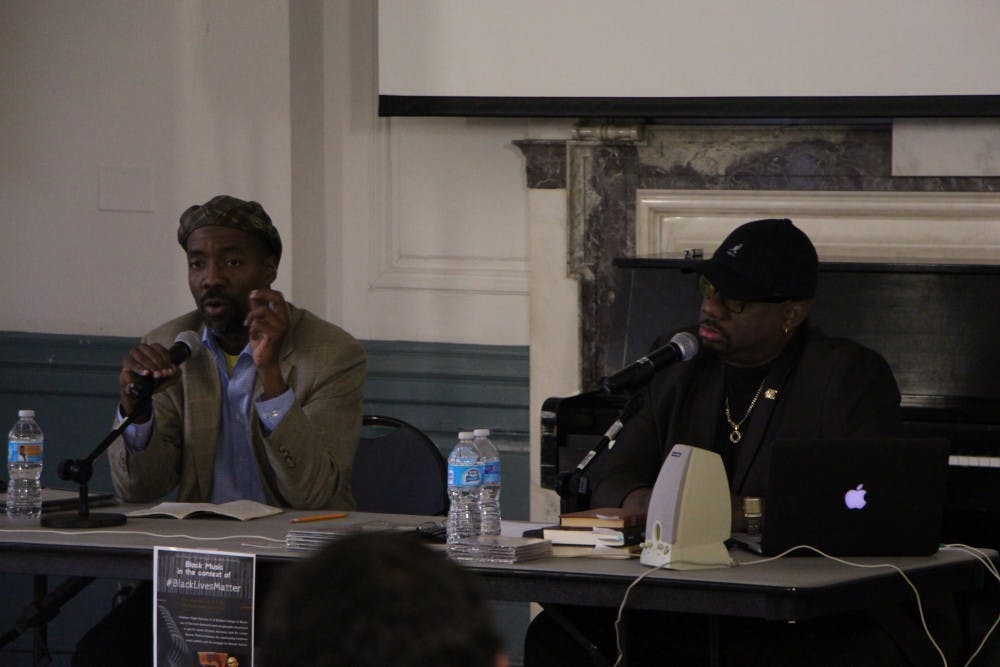By KELSEY KO For The News-Letter
Professor and jazz artist Ralph Peterson, Jr. of Berklee College of Music and Hopkins Associate Professor Lester Spence discussed the historic link between black music and social movements in the context of the current national movement #BlackLivesMatter in Levering’s Great Hall on Friday.
Spence, a professor of political science and Africana studies, grew up listening to black musicians such as Miles Davis and John Coltrane. He said it helped him connect with the black culture of his parents’ and grandparents’ generations.
“Having jazz in the house connected me to a tradition that wasn’t just my father’s tradition but my grandfather’s. So what listening to jazz in particular did for me growing up as a ‘70s kid, was that it gave me almost a direct connection to the ‘50s, ‘40s and the ‘30s. It usually takes a kid a while to realize that stuff happened before him or her, but listening to jazz not only exposed me to a certain type of art and gave me a certain type of ear, it connected me to a tradition — to a tradition of black life that wasn’t just about suffering and pain and dysfunction,” Spence said.
He believes that music is especially connected to political and social issues in the black community.
“In Stare in Darkness, my first book, what I’m really interested in doing is studying how the relationship between political context and popular culture — in this case, rap and hip hop — mirrors political context. We’re in a new context even compared to when I wrote that book, where the phrase ‘Black Lives Matter’ is arguably the most important phrase in mini-segments of American communities... definitely [in] places like Hopkins and Baltimore given Freddie Gray’s [death],” Spence said.
Hollis Robbins, chair of the humanities department at the Peabody Institute and director for the Center for Africana Studies at Hopkins, specifically organized Friday’s event in light of the Freddie Gray protests.
“So many Krieger School students and Peabody students were involved in the protesting of Freddie Gray and were involved in the marches back in April and May. I wanted to put together an event that allowed students and faculty to discuss the role of music in #BlackLivesMatter. When we got Ralph Peterson to come as the 2015 Artist-in-Residence for Africana studies, I thought he’d be the perfect person to discuss the role of music in protests,” Robbins said.
Peterson mentioned how music has been related to racial issues in the past.
“The avant-garde period was a musical expression of the explosiveness that was happening when Newark was on fire. A lot of the colleges that sprang up in the wake of the ‘60s riots were built because some folks decided that if we don’t educate these people, they’re going to start burning down the suburbs,” Peterson said.
Throughout the discussion, Spence and Peterson debated the relationship between social movements and the political pieces of music that spring forth from the injustice within the black community.
“I would actually argue that the social movement comes first and then sometime after that there’s a lag effect, and then the music picks up,” Spence said.
Peterson agreed that music follows social movements.
“The injustice comes first. The movement is an answer to the injustice, and the song becomes a way for masses of people to express the same idea simultaneously. That’s the power of the song,” Peterson said.
Spence also discussed the power of music to influence social movements.
“Music is so much quicker than politics. Music combines a lot of dense information in a little package that will have kids uttering it, not knowing what they’re saying. It’s a two-fold danger. One is primarily music, where there’s something in there that’s going to catch and move in ways that government or folks can’t control. The second way is through an artist making a statement, and then that artist has a weight because he or she ends up creating things that can’t be controlled,” Spence said.
Peterson stressed the importance of fighting against injustice.
“The view of us as a community can’t be shaped by those who impose their thinking on us. We have to push back and say what we think matters. Getting pulled over because your taillight was out should not be a death sentence. Selling cigarettes on the street should not cost you your life. And what does a community do with that energy if there’s no outlet for it?” During the question and answer portion of the discussion, Peterson and Spence discussed what makes a free African-American artist such as Kendrick Lamar or Kanye West powerful and even viewed as “dangerous” in America.
“A free artist can’t be controlled. If you can’t control an artist, you can’t make him say what you want him to say in order for him to sell what you want to buy. But freedom ain’t free — freedom costs. One of the costs of freedom is short-term popularity,” Spence said.
For Peterson and Spence, black music’s ability to deliver important political and social messages is irrefutable.
“Rap does an excellent job at reproducing the dominant tendency in black life. So when that dominant tendency is politically problematic, rap is going to give to that. When that dominant tendency is ripe with political possibility, rap is going to give you that,” Spence said.





